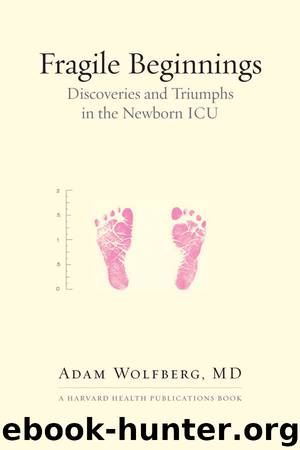Fragile Beginnings by Adam Wolfberg MD

Author:Adam Wolfberg, MD
Language: eng
Format: epub
Publisher: Beacon Press
Published: 2011-11-05T16:00:00+00:00
Chapter 7. Is Your Life Good?
Amyotrophic lateral sclerosis, also known as ALS or Lou Gehrig’s disease, is a progressive illness in which paralysis slowly sets in while cognitive function remains intact. Patients diagnosed with the disease often recall a clumsiness—increased tripping, or worsening penmanship—that went unexplained for months. Patients with ALS eventually lose the ability to walk and become wheelchair-bound. At some point, they become unable to swallow and need a tube inserted into the stomach to receive nutrition. Speaking and breathing also become impossible, as the muscles of the diaphragm and chest refuse to function. A tracheostomy—an aperture made surgically through the neck and into the trachea—connected to a ventilator is required to prolong life when this happens. Ultimately, a locked-in state occurs in which all muscular activity, even blinking, is impossible; sight, smell, hearing, and the normally functioning mind are intact, but the individual has no way to communicate with the world around him.
The disease arrives in middle age. Patients have normal lives until that point—they have families, careers, hobbies. Unlike a child born with cerebral palsy who never learns to walk, those with ALS have the ability but lose it. Because their cognitive capacity never wanes, they can make choices for themselves. Some decide not to have the feeding tube implanted and opt to die when they can no longer eat. Most accept the feeding tube but opt not to have the tracheostomy. When the patient’s breathing fails, the level of carbon dioxide in his blood rises and he goes to sleep. A morphine infusion wards off the panic that accompanies suffocation.
Time is on the side of the patient with ALS. He takes stock of his life on a daily basis and decides for himself when his quality of life has deteriorated to the point that death is preferable. A decision doesn’t have to be made in an instant, or in a day.
Because the progression of ALS is slow—although inexorable—the patient can reflect on his sadness at the life he has lost while learning to appreciate the life that he still has.
Often, quality of life becomes a moving target. What was unacceptable when the diagnosis was made—a life without walking, a life without eating, a life without conversation—becomes tolerable when the alternative is death. But the decision is the individual’s. The health-care proxy—the person empowered to make decisions for the patient when the patient cannot make the decisions himself—is really just an agent acting on the patient’s wishes, confident that the decisions are the patient’s and no one else’s.
I had an image of Larissa at thirteen in a bulky motorized wheelchair padded to support the spastic limbs of a child with cerebral palsy. In my imagination, it is evening, and her sister Hannah, now sixteen, has just gone out with a group of friends. Children in Larissa’s class are having a party, and Larissa has been invited, but she doesn’t want to go. “Look at me,” she says to Kelly and me. “Why would I go to the party?”
There are sharp differences between cerebral palsy and ALS.
Download
This site does not store any files on its server. We only index and link to content provided by other sites. Please contact the content providers to delete copyright contents if any and email us, we'll remove relevant links or contents immediately.
| Cell Biology | Developmental Biology |
| Entomology | Marine Biology |
| Microbiology | Molecular Biology |
| Biostatistics |
Sapiens: A Brief History of Humankind by Yuval Noah Harari(14389)
The Tidewater Tales by John Barth(12659)
Mastermind: How to Think Like Sherlock Holmes by Maria Konnikova(7347)
The Thirst by Nesbo Jo(6944)
Do No Harm Stories of Life, Death and Brain Surgery by Henry Marsh(6941)
Why We Sleep: Unlocking the Power of Sleep and Dreams by Matthew Walker(6726)
Life 3.0: Being Human in the Age of Artificial Intelligence by Tegmark Max(5558)
Sapiens by Yuval Noah Harari(5372)
The Body: A Guide for Occupants by Bill Bryson(5098)
The Longevity Diet by Valter Longo(5065)
The Rules Do Not Apply by Ariel Levy(4970)
The Immortal Life of Henrietta Lacks by Rebecca Skloot(4589)
Animal Frequency by Melissa Alvarez(4474)
Why We Sleep by Matthew Walker(4447)
The Hacking of the American Mind by Robert H. Lustig(4383)
Yoga Anatomy by Kaminoff Leslie(4363)
All Creatures Great and Small by James Herriot(4322)
Double Down (Diary of a Wimpy Kid Book 11) by Jeff Kinney(4273)
Embedded Programming with Modern C++ Cookbook by Igor Viarheichyk(4182)
